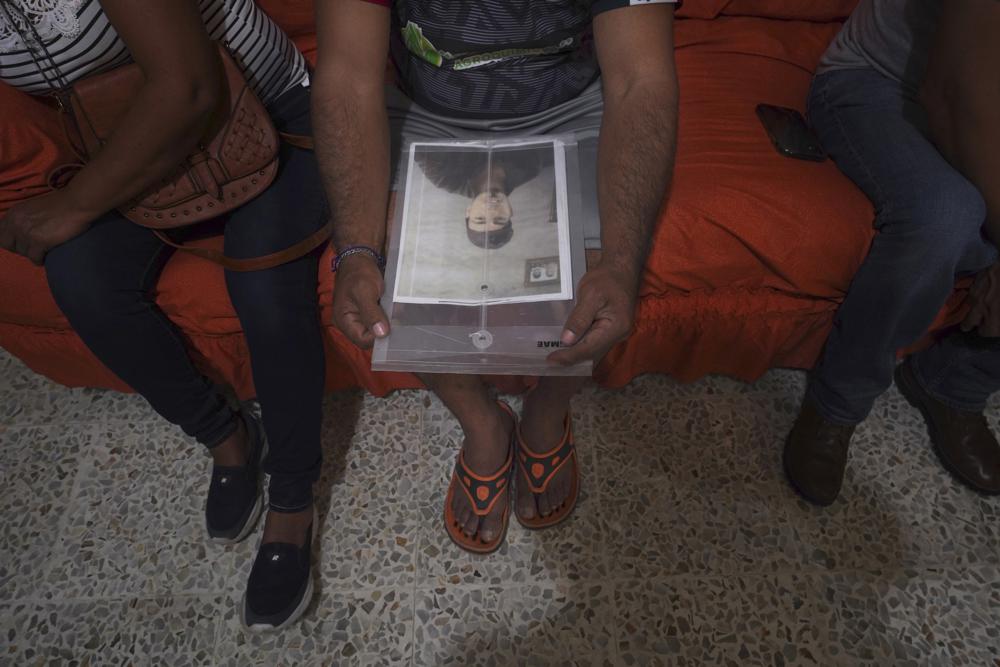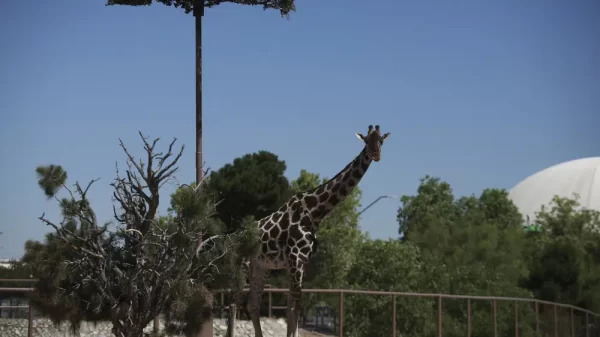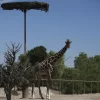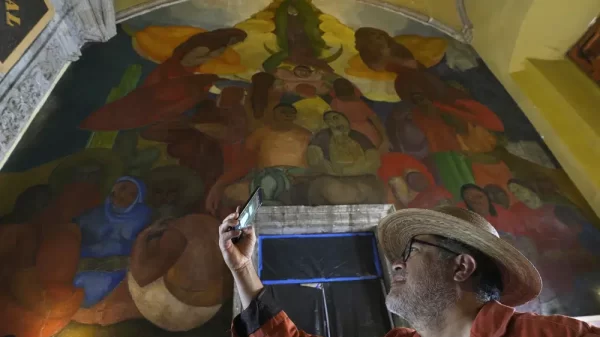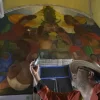Salvador Morales holds a folder containing a photo of his disappeared son Alan Morales, during a meeting of the Milynali Network, a collective of families that aid in searches of disappeared relatives, in Ciudad Mante, Mexico, Monday, Jan. 31, 2022. Morales said his son Alan was coming back from picking oranges with his own 7-year-old son when he disappeared with four other people in October. (AP Photo/Marco Ugarte)
CIUDAD MANTE, Mexico (AP) — Graciela Pérez listened as the families told the stories of their missing relatives — stories so much like those of other families she and her organization had tried to help. Stories so much like her own.
Mexico’s missing could fill a small city, and a rapidly growing one, at that. The rolls of the disappeared have risen from about 26,000 in 2013, to 40,000 in 2019, to a current, official tally of nearly 100,000. And nearly every one of them had a family left bewildered and bereft.
It was for those searching for their loved ones in the northern city of Mante that Pérez established the Milynali Network, a collective of families that aids in their search.
Pérez founded the group in 2012, when her daughter Milynali disappeared along with four relatives on their way home from Houston. None of them have been found, alive or dead.
Over 10 years, the group has registered 320 disappearances and has found and identified the remains of 16 people. On a recent day, two more families came seeking help, photos of their missing on their laps. Photos of others of the disappeared dangled from a cord strung across the room.
Elizabeth Meléndez admitted that until her son Javier Alexis disappeared in December, she didn’t realize “there’s another world you don’t want to see but is right there in front of you.” Armed men dragged the 26-year-old schoolteacher away. His grandfather stood by, frozen in place by a gun held to his head.
Meléndez managed to speak with her son by phone. He begged her to withdraw the police report — though she had not, in fact, gone to police at that point — and said if she did not, he would not be released.
Sitting beside her, Salvador Indalecio Morales said his son Alan was coming back from picking oranges with his own 7-year-old son when he disappeared with four other people in October.
One of the others taken with Alan — Morales’ nephew — was released days later, but Morales hasn’t been able to speak with him. When they cross paths in the street, Morales’ nephew lowers his head. Anonymous whispers warned of serious consequences if Morales asked too many questions.
In the middle of his story, Morales motioned at one of the pictures hanging across the room. “I hung out with him,” he said. He recognized another as a neighbor.
Despite a new search protocol that requires authorities to mobilize immediately to look for someone, that didn’t happen in the cases of Meléndez or Morales. Police didn’t even want to give Morales a copy of his report.
That’s not unusual although it is now illegal. In another case two hours’ drive from Mante, in the state capital Ciudad Victoria, officials told a woman in January to come back after she did not hear from her missing relative for 72 hours. They said they were busy with three other disappearances.
The Milynali Network also takes on older cases, like that of María Rosario Nava, who has been looking for a corpse for 10 years. Her sister Norma Elizabeth disappeared while going out to buy diapers. Two weeks later, authorities showed Nava photographs of a body with unmistakable tattoos: it was her sister. But they never gave her the body. They told her it was incomplete and that they had to perform DNA tests.
“I told (the official), ‘Give me what you have and I’ll put it together,’” she said. The genetic test results never arrived, but the state is moving unidentified bodies from common graves to special cemeteries where those remains can be easily found if a match is made to a relative. So she contacted Pérez for advice.
Authorities recognize the severity of the problem, but there still aren’t the resources to meet the demand.
The families are patient. They continue going out to sort every bone from every stone, despite the risks. Last July, a 28-year-old woman who searched for the missing was murdered in the northern state of Sonora and a man looking for his son was killed in Zacatecas.
And the number of missing continues to grow, which means, Pérez said, that the government is either ignoring or colluding with criminal groups.
“Which to me is terrifying,” she said.
Copyright 2021 Associated Press. All rights reserved.
Source: https://apnews.com/article/mexico-caribbean-7bb04557d45fa3264cfd37a42b918168





















